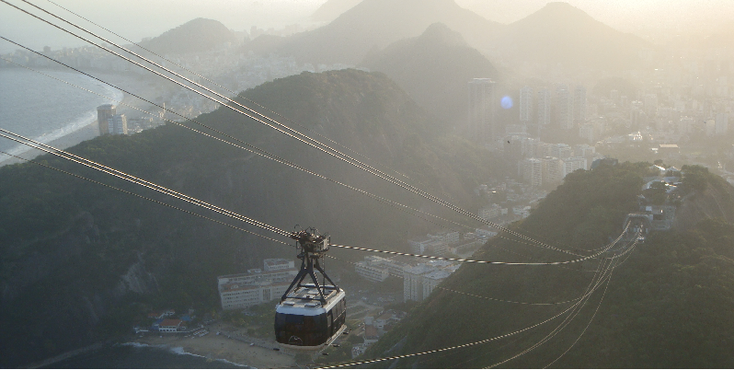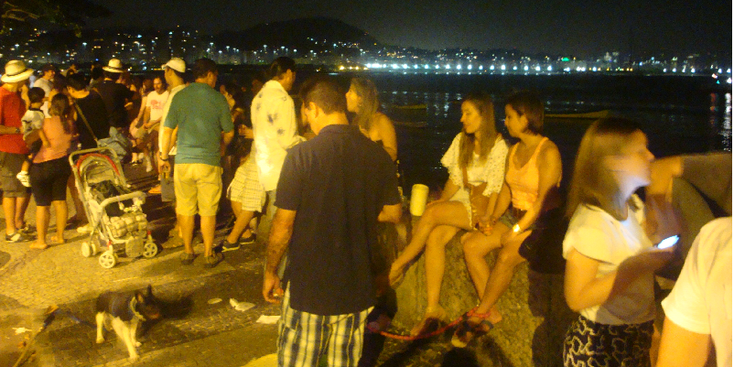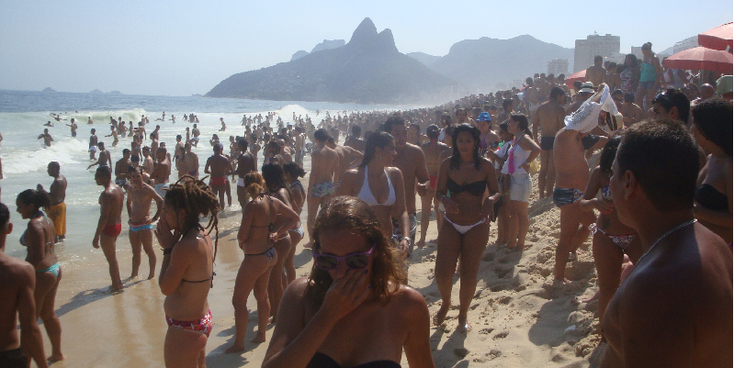Rio de Janeiro
Places of Interest - Brazil


introduction
We may say that Rio de Janeiro is one of the most eventful cities in the world; Rio with a rich past, blessed with amazing wide sandy beaches and with the most beautiful people in the world, a stone's throw from the tropical rainforest, the biggest party on earth and lots of music, culture and activity. Until 1960, Rio was the capital of the country, but would then experience hard times, causing many slums (favelas) to arise throughout the city.
The gigantic image of Christ the Redeemer standing on the Corcovado hill can not change anything about that unfortunately. Rio is, like Brazil, footballcrazy; the city has four professional club teams and the city has the largest and perhaps most notorious football stadium in the world: the Maracana. A visit to the Sambadrome (during Carnival), a look at the Copacobana beach, an evening during a samba session in the Lapa district or a walk along ancient colonial buildings in the historic center will remain a unique memory.
highlights

Pao de Acuar
From the sugar loaf hill you probably have the best view of one of the most impressive and beautiful cities in the world. Try to avoid the "prime-time" tourist times because it can really become very crowded so that enjoying the panorama is out of the question.
Take food and drink as the prices at the top restaurant are sky high. This pointed mountain, one of the symbols of Rio de Janeiro, can be reached via a cable car but can also be climbed from the back with some art and flight work.

Ipanema & Copacobana beach
Perhaps the world- most famous beach Copacobana has the name and reputation but the trendy Ipanema beach steals the real show. Along the boulevard with trees on both sides of Ipanema are numerous restaurants, cafes, shops and clubs and is a place for old hippies but also pop stars, models and children from the poor favelas.
Life starts in Brazil on the beach and is a very important cultural thing. The beach is narrow because of the strong current something that is locked in the name "Ipanema" but is certainly packed on weekends. The Copacobana beach is much wider, quieter and here you will find a lot of volleyball and football youth playing “ball”. It is lit up at night but it is not advisable to just snoop around here because it can be dangerous.

Carnival (Sambadrome)
The most exciting, exotic and extravagant parade of “floats” in the specially made stadium, the Sambadrome, is the crème de la crème for the largest carnival party worldwide.
The party, the people, the enthusiasm and the show are the ingredients for an unprecedented experience that equals nothing on earth.
If you have the chance to attend this you have to go, despite the sometimes high costs. In addition to the Sambadrome, many "blogs" are held every day during carnival in different city districts at different times and in different styles - street stages with a dancing crowd with drinks and music.
Other attractions:
- Jardim Botanico and the neighborhood Lapa.

history

Rio de Janeiro was founded by the Portuguese on 1 March 1565 under the name Saõ Sebastião do Rio de Janeiro, with the intention of expelling other Europeans, in particular the French, from the area. They had attempted to take possession of this area. In the course of time, Rio became an increasingly important trading city for the Portuguese, as a result of which competitors such as the French and Dutch attacked the city several times.
Eventually the Dutch were expelled from the area in 1654 by the Portuguese. At the end of the 17th century Rio was the third most important settlement in Brazil (after Salvador and Recife-Olinda). This was mainly due to the flourishing cultivation of sugar cane and the exploitation of the mines in Minas Gerais. In 1807, Napoleon's troops advanced to Lisbon in Europe. Two days before the invasion, 40 ships left with passengers the Portuguese Crown Prince “Dom João VI” and his full court of 15.000 people. When he later became King of Portugal, he proclaimed Rio the capital of the United Kingdom of Portugal, Brazil and the Algarve.
When Brazil became independent from Portugal in 1822, Rio de Janeiro became the capital of the new nation. At the end of the century, many European immigrants came to Rio and many (former) slaves settled in the city and it grew explosively. Rio developed in the early 20th century as an exotic and romantic place and many Hollywood stars and people from the high society brought in money. In 1960 a new capital of the country was built, Brasilia, and (unfortunately) many colonial buildings were demolished for new construction. Also the first large favelas (slums) were created that are still clearly visible throughout the city.
Rio will organize the 2016 Summer Olympics. In 2009 the city was chosen over Chicago, Madrid and Tokyo. It will be the first time that a South American city will receive the organization of the event.

tips & advice (2011)

There is a large (international) busstation in Rio where you can find different bus tour companies with different qualities and prices along different kiosks. Downstairs, on the ground floor it is a bit chaotic but there is a good English speaking information desk with people who can help you further.
Rio de Janeiro - Ilha Grande: 2 hours by bus from the main bus station to the village Mangaratiba where the ferry goes to Ilha Grande (Vila do Abraao). There are two per day (8:00 and 22:00) and the trip costs R $ 6.50. You can get a private boat for R $ 20. But there are more boats in another small village (Jeri). This village can be reached by minibus which takes about 25 minutes. This boat costs R $ 15 and takes about another half an hour.
Rio de Janeiro - Paraty: the journey from Rio to Paraty takes about 4 hours by bus.
Rio de Janeiro - Buenos Aires (ARGENTINA): On the first floor are a number of companies that leave for Buenos Aires. The trip takes about 46 hours and is worth it (compare prices with flying) but the buses are comfortable and good. Price is R $ 286.

On Copacobana beach you can buy delicious churasco's and cocoada - it looks like a plate of rice with a mix of condensed milk and some coco's.

-
Name: Crab hostel
Address: Rua Prudente 903
Price: 50 $ R (dormitory) - during carnival only possible to book a few days
Website: www.crabhostel.com
Content:
A great hostel near the famous Ipanema beach in a fine location. Large rooms with many beds with spacious shower and toilet rooms. Breakfast is included and is presented as a buffet at the small wooden picnic tables in the morning - not super, but sufficient. It is a bit of a party hostel so you have been warned.

see also:
LANDEN:
EUROPA:
Albanië * België * Bosnië-Herzegovina * Bulgarije * Denemarken * Duitsland * Engeland * Estland * Finland * Frankrijk * Griekenland * Hongarije * (Noord) Ierland * Italië * Kosovo * Kroatië * Letland * Litouwen * Luxemburg * Macedonië * Malta * Montenegro * NEDERLAND * Oekraïne * Oostenrijk * Polen * Portugal * Roemenië * Rusland * Schotland * Servië * Slovenië * Slowakije * Spanje * Tsjechië * Turkije * Zweden
NOORD EN CENTRAAL-AMERIKA:
Chili * Costa Rica * Cuba * Guatemala * Mexico * Nicaragua * Panama * Verenigde Staten
ZUID-AMERIKA:
Argentinië * Bolivia * Brazilië * Colombia * Ecuador * Peru
AFRIKA:
Botswana * Burkina Faso * Egypte * Ethiopië * Ghana * Kenia * Mali * Marokko * Namibië * Oeganda * Senegal * Tanzania * Tunesië * Zuid-Afrika
MIDDEN-OOSTEN:
Iran * Israël * Jordanië * V.A.E.
AZIE:
Armenië * Cambodja * China * Filipijnen * Georgië * India * Indonesië * Japan * Kirgizië * Laos * Maleisië * Mongolië * Myanmar * Nepal * Oezbekistan * Singapore * Sri Lanka * Thailand * Vietnam
OCEANIE:
Voor meer reisfoto's kijk op www.instagram.com/cheapskatetravel.nl:
© Cheapskatetravel.nl; 2018 (all rights reserved)


